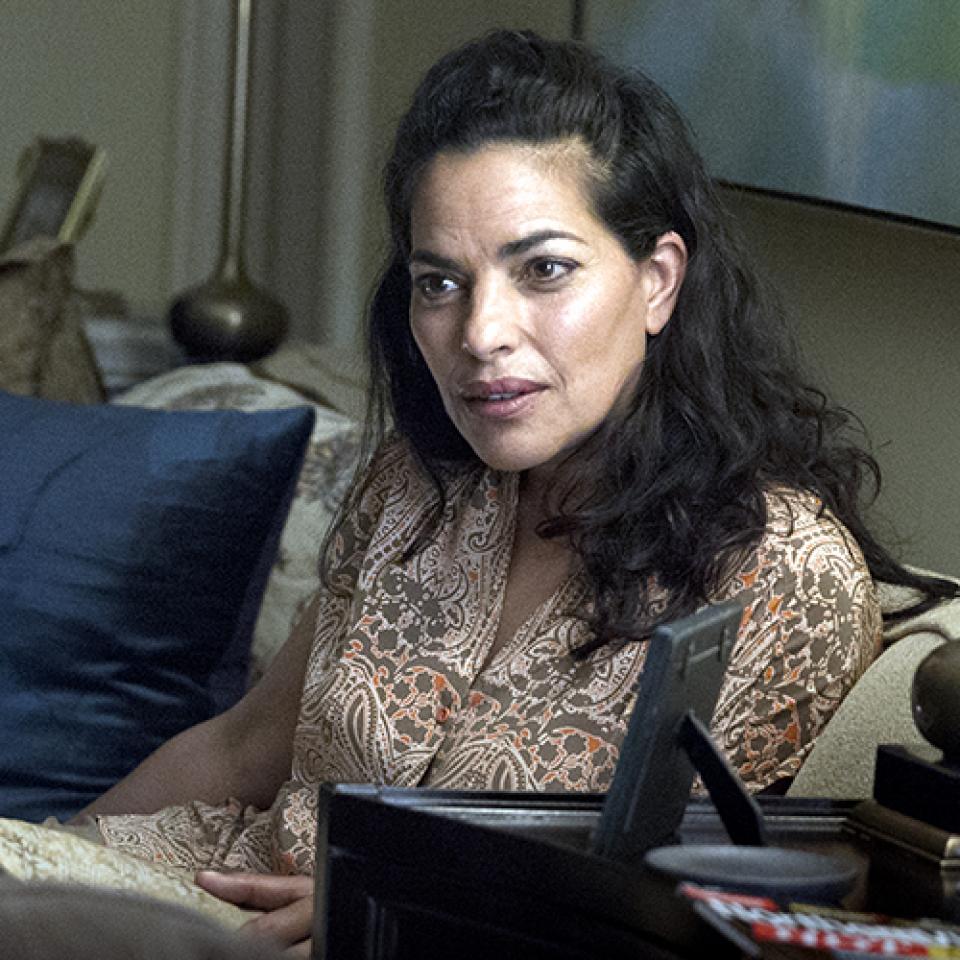Sharp-eyed fans of the third season of the hit cable television series Homeland may have noticed that Queen’s alumna Sarita Choudhury, Arts’89, is now a regular member of the cast.
Sarita’s character – the wife of Saul Berenson, the CIA man played by Mandy Patinkin – debuted on Homeland as a “guest star” in Season One. So strong was the on-screen chemistry between Sarita and Patinkin that the show’s writers decided to expand her role.
“Working with Mandy is an absolute joy,” says Sarita. “He’s a terrific actor, and I play off what he does on camera. He’s like a fine wine: subtle and yet active. That’s really an odd combination in an actor.”
How did Sarita go from Queen’s to a plum role in one of today’s most critically acclaimed television shows? It’s an intriguing story, that.
The middle of three children and English born, Sarita grew up in Jamaica and Italy. Her father, a scientist, had a global perspective. “There are lots of Jamaicans in Canada,” Sarita explains. “That’s why when it came time for my big brother, Paul [Choudhury, Sc’87, MSc’90], to go to university, my dad looked north. He felt the Canadian educational system was similar to the one in Great Britain, which he was familiar with.”
When Paul enrolled at Queen’s, Sarita soon followed in his academic footsteps. Arriving on campus in the fall of 1986, she settled into Victoria Hall with plans to become an economist. But things didn’t work out that way. “As a little girl I loved to dance. I had started taking lessons when I was four. By the time I was 16, I was dreaming of becoming a dancer or an actress,” Sarita recalls.
At Queen’s, she became interested in film studies, took some courses, and began acting in films being made by her classmates and friends. “My student experience at Queen’s changed my life; it really did,” she says.
When Sarita decided to pursue an acting career, it was one of her professors at Queen’s who opened the door for her to do so, albeit in a decidedly unexpected way.
“After graduating in 1989 [with a BA in Economics and Film Studies], I went to Rome, where my parents were living at the time,” Sarita recalls. “Prof. Frank Burke from Film Studies had written a book about Federico Fellini, the great Italian film director, and he gave me a letter of introduction. When I told my mother this, she said, ‘Well, let’s get in the car and go see him.’ I thought she was crazy, but away we went. The address Frank Burke had given me was at Cinecittà Studios, in Rome. When I knocked on Fellini’s door, not only did he see me, he gave me a job translating scripts.”
That work gave Sarita opportunities to make connections in the film industry, which in turn led to her auditioning for movie roles. Predictably her steamy beauty, dancer’s gracefulness, and linguistic abilities caught the eye of casting directors. Talk about a jump-start to a career.
Her first big role was in Mississippi Masala, 1991 film directed by the acclaimed Indian director Mira Nair. Sarita’s co-star in this tale of interracial romance between a black American man and an Indian woman was Denzel Washington – not a bad choice as a leading man for any young actress out to make her mark.
Sarita was as lucky as she is talented. Mississippi Masala became an art house hit, and her stand-out performance won rave reviews. Movie, stage, and television roles have followed, in the U.S., England, and India. You may have seen Sarita on the big screen with such Hollywood A-list stars as Meryl Streep, Jeremy Irons, Michael Douglas, Gwyneth Paltrow, Glenn Close, LLD'13, Anjelica Huston, and Marisa Tomei.
One aspect of being a member of the Homeland ensemble cast that Sarita has appreciated is that until recently she’s only been obliged to be on set a few days at a time. This has left her free to take on other work, especially on the stage. “Now that I’ve become a ‘regular’ on Homeland, I’ll have to see how it goes,” she says.
“But I’m not complaining. I couldn’t be happier. I love being on the show. The cast members are phenomenally talented and the scripts are beautifully written, with storylines that deal with really timely and important issues. It’s easy to understand why the show is so popular.”


